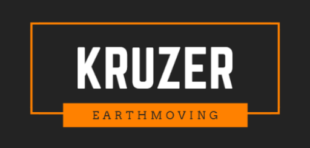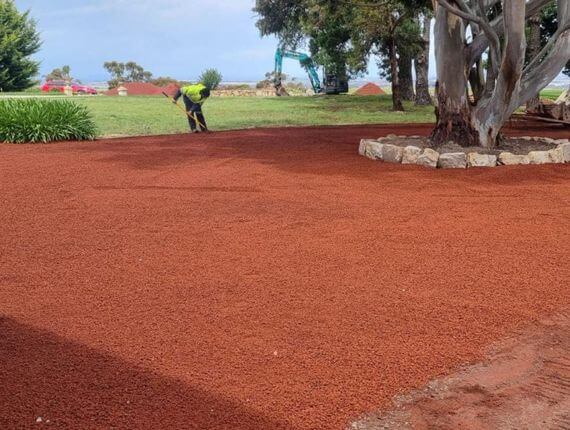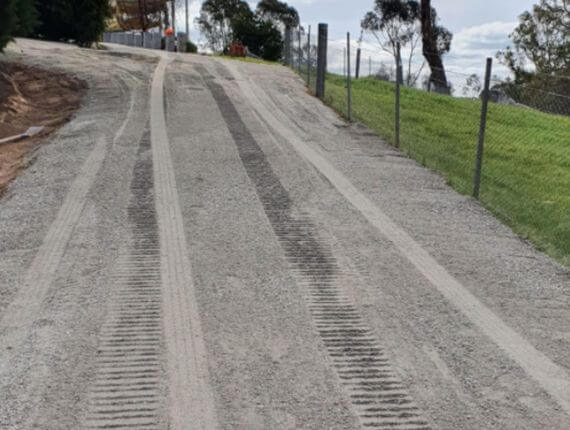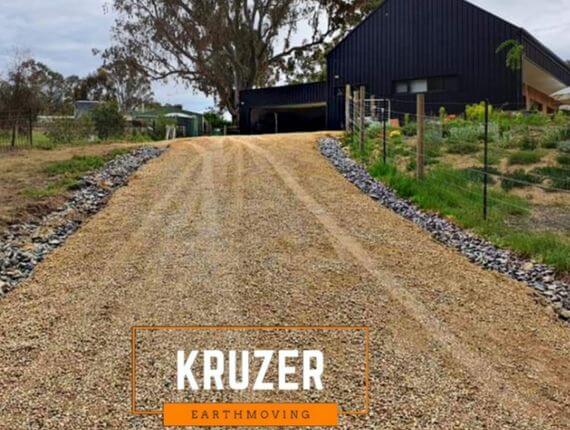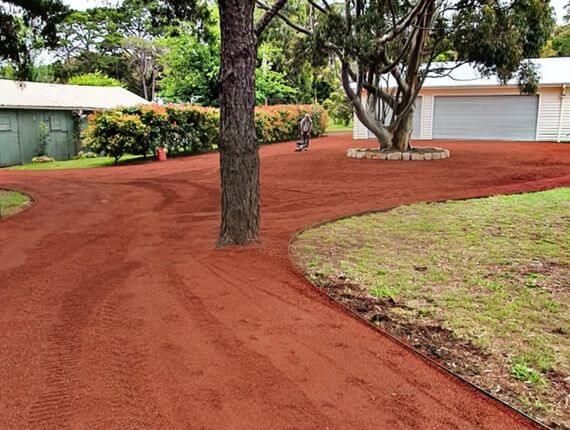COMPLETE DRIVEWAY SOLUTIONS
GRAVEL DRIVEWAY
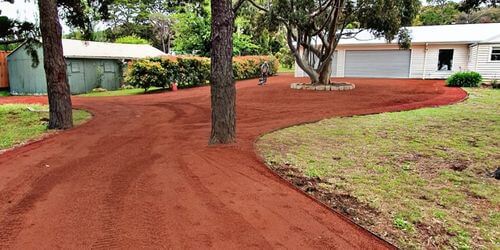
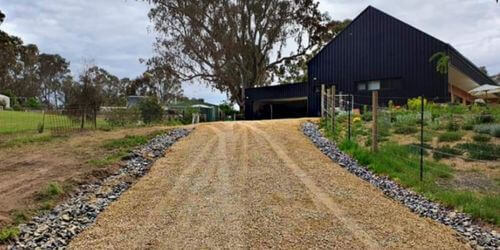

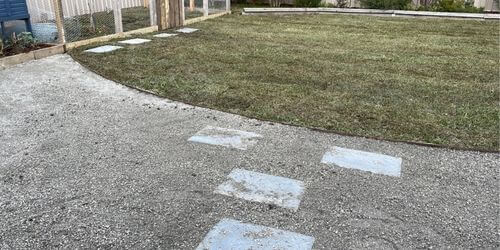
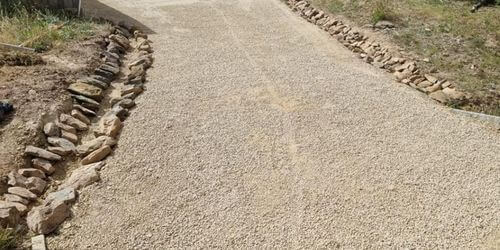
GRAVEL DRIVEWAY INSTALLATION IS THE BEST CHOICE
There is no denying the importance of first impressions, particularly regarding real estate. The curbside appeal of a house is essential for real estate brokers, potential purchasers, and, of course, you, the homeowner. Additionally, when in good condition, your property’s grounds and exterior can increase its value by up to 5%. Asphalt, tarmac, and cobblestone are all options for driveways, although most people choose gravel or concrete. You might not realise it, but there are many factors to consider when choosing your surface, including aesthetics, durability, and upkeep.
Gravel fits and complements both ultra-modern and more traditional buildings thanks to its wide variety of sizes and colours. Due to its adaptability, it is the perfect surface treatment for anybody looking to improve the visual appeal of their house with a lovely, warm driveway and approach. Laying a gravel driveway is a reasonably simple and affordable driveway installation method. Gravel driveways are the least expensive of the many driveway styles, with many different kinds. As long as the driveway surface has already been levelled, gravel driveways and paver driveways are simple to install. Gravel driveways are more resilient to Victoria’s ever-changing conditions than asphalt or concrete ones. Unlike concrete or asphalt roads, which can collapse during extreme cold and subsequent thawing, gravel is typically unaffected by wintertime freezing and thawing. Indeed an excellent choice for your Victorian home!
So, if you want to give the outside of your Victorian home a much-needed upgrade, consider adding a gravel driveway and new pavers from Kruzer Earthmoving.
VAST SELECTION OF GRAVEL TYPES AVAILABLE
A surprisingly wide range of materials is available for making a gravel driveway, from basic drainage crushed gravel to beautiful marble chips. Choosing the best solution might be challenging, with so many possibilities available. Kruzer Earthmoving can help you narrow your list down depending on your requirements. The most common types of gravel used in driveways are listed below:
- Pea Gravel
- River Rock
- Crushed Stone
- Stone Dust
- Quarry Stone
- Marble Chips
- Jersey Shore Gravel
GRAVEL DRIVEWAY MAINTENANCE IS A BREEZE
What your driveway looks like says a lot about your home and your lifestyle. A gorgeously constructed and kept-up driveway boosts aesthetic appeal, acts as a focal point for guests as they approach your house, and raises the value of your property. Gravel driveways are the cheapest yet most flexible driveway solutions you can find. The best part is- maintenance is as easy as 1,2,3!
- Fill Potholes before they get worse
- Fix and level-out low spots
- Grade your gravel driveway once or twice a year
- Spray your driveway with herbicide to prevent weed growth
- Unclog drainage ditches
If you can’t do maintenance on your own, let the experts at Kruzer Earthmoving do it for you!
GRAVEL DRIVEWAY DESIGNS BY KRUZER EARTHMOVING
The driveway should be taken into account while planning a home’s landscaping. The driveway design is frequently the homeowner’s responsibility in non-master-community projects, estates, and rural locations. Concrete, asphalt, brick/concrete pavers, permeable pavers, cobble driveways, and a range of gravels and aggregates are just a few available alternatives. A driveway may contribute to the first impression people get of a house in addition to being practical and able to handle different types of traffic. Whether you’re going for a rustic cottage vibe or a sleek urban setting, these gravel driveway ideas will surely spark some creativity. Here are some design tips for gravel driveways that Kruzer Earthmoving can make a reality:
- Install round gravel Driveways
- Add some colour to your driveway
- Mix it up with some block paving
- Add a fountain
- Patterned gravel driveway
Homeowners, businesses, communities, and schools may all hire us to build a gravel driveway. Because of our experience, our staff will make every effort to fulfil your project needs. You’ve struck gravel driveway service gold if you’re looking for a specialist who also does driveway resurfacing and driveway edging. We will match you with the driveway experts at Kruzer Earthmoving who are certified and experienced in gravel driveway and crushed rock driveway services and more to assist and guarantee your driveway landscaping , installation, and gravel driveway maintenance services work is a smooth and hassle-free experience. Call us today!
PROS AND CONS OF GRAVEL DRIVEWAYS
PROS
- Cost-effective
- Easy Installation
- A wide array of colours and gravel types to create a unique driveway
- Minimal maintenance
- Gravel is porous and is highly helpful in water drainage
CONS
- Possible washouts due to heavy rainfall
- Does not allow the use of snow plows during winter
- Weed growth in between the gravel
- Challenging to clean
- Prone to potholes
You can see that there are a lot of factors to take into account when weighing the advantages and disadvantages of a gravel driveway. Which material is the finest for your driveway truly depends on what you are individually searching for. Contact our driveway crew at Kruzer Earthmoving if you have any more inquiries regarding gravel driveways and upkeep.
KRUZER EARTHMOVING - RELIABLE GRAVEL DRIVEWAY CONTRACTORS
At Kruzer Earthmoving, we think that our dedication can be summed up in four of the most important facets of our enterprise:
- Quality
- Integrity
- Customer Service
- Building Relationships
GRAVEL DRIVEWAY FAQ
The price to create a gravel driveway may vary depending on the size of the project and the amount of time required. In Australia, the cost of a cubic yard of gravel ranges from $55 to $120 on average, and the labour cost to instal it is about $5 per square metre.
According to experts, the gravel kinds described below constitute the finest driveway surfacing solutions because they blend tiny stones with rock dust to provide a more stable driving surface.
- #3 Gravel
- Crushed Stone #441
- #4 Gravel
- Pea Gravel
- Marble Chips
- Crusher Run
- Jersey Shore Gravel
- Black Trap Rock
The initial layer of stones in a gravel road should be at least 4 inches deep and be the size of a baseball. Each subsequent layer should be 4 inches thick and made of successively smaller stone, according to experts in construction.
There are less expensive choices on the market if you want a gravel driveway for your house but are on a tight budget. Crusher run, crushed shells, crushed concrete, slate chips, recycled asphalt, and pea gravel are the least expensive kind of gravel for driveways; when bought in bulk from a quarry, they range in price from $15 to $30 per yard, or less than $1 per square foot.
One of the first steps before you start constructing a gravel driveway is to plan the layout of your driveway. Follow the minimal specifications to prevent problems after the construction. Driveways should be at least 10 feet wide, and a 12-foot width allows you to get out of the car and onto the gravel with ease. Allow up to 14 feet in width when the driveway has a complete wall along one side. A minimum of 18 feet of space per vehicle is required for the total length.
Landscape fabric must be laid down beneath the gravel for a gravel driveway to be exceptionally sturdy and resistant to wear and strain. Even though gravel driveways often contain multiple levels of gravel, the first layer still has to be covered with landscaping fabric. The ideal use for non-woven landscape fabrics, which are commonly composed of polyester or polypropylene, is to stop weed growth in rock or gravel roads or beds. Landscape textiles that are non-woven are less permeable than those that are woven, thus they will keep water and nutrients from reaching the soil below.
